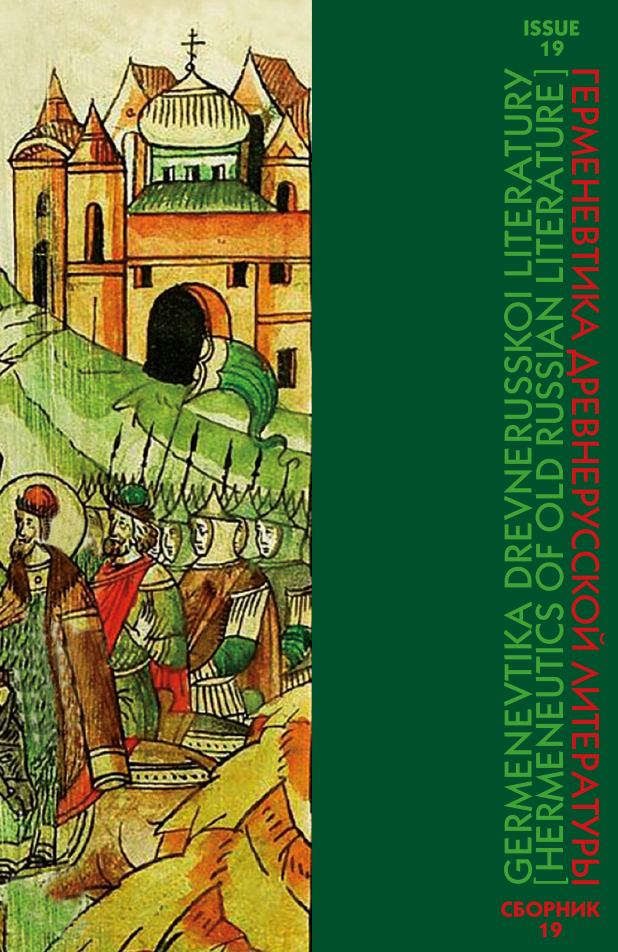Abstract:
The article examines the poetic text Kolyada for Little Children, which is written in a “prosta mova” (language of Lithuanian Rus’) and is in the convolute of the 17th–18th Centuries from the collection of manuscripts by T.F. Bolshakov (RSL, f. 37, no. 23). The verses belong to a group of works in which a rod is praised and the practice of physical punishment of children is approved. According to the article’s author, the source of all the texts are Polish verses 17th century on a rod, one of the versions of which came as part of the Polish textbook Elementa Pverilis Institutionis edited in 1736. By comparative analysis, it was found that Kolyada for Liittle Children is a literal translation of the Polish text, contains a significant number of polonisms and evidence of misunderstanding by the translator of some Polish words. The fact distinguishes the work from the verses on a rod in the Russian educational literature of the 17th–18th centuries (Simeon Polotsky’s ABC-book, alphabet books of the 17th century), in which there aren’t any polonisms and translation errors, changes have been made to the order of words, lines, rhymes, there are elements indicating cultural adaptation. In the convolute (RSL, f. 37, no. 23) Kolyada for Little Children is in the context of moral works, united with them by the theme of vices and their destructive consequences for human personality. In the collection the verses are functionally connected with subsequent text — the Legend of Literacy, since both texts could be used for educational purposes.
REFERENCES
1 Korzo, M.A. “K istorii pol’sko-latinskikh uchebnikov dlia nachal’nogo obucheniia XVII–XVIII vv.” [“On the History of Polish-Latin Textbooks for Primary Education of the 17th–18th Centuries”]. Otechestvennaia i zarubezhnaia pedagogika, no. 3 (30), 2016, pp. 98–108. (In Russian)
2 Kosheleva, O.E. “Teksty o vospitanii detei v literature rossiiskogo barokko (shkol’nye azbukovniki XVII veka)” [“Texts about Upbringing of Children in the Literature of Russian Baroque (School ABC-books of the 17th Century)”]. Detstvo v nauchnykh, obrazovatel’nykh i khudozhestvennykh tekstakh [Childhood in Scientific, Educational and Artistic Texts]. Kazan, Kazan University Publ., 2011, pp. 14–21. (In Russian)
3 Kosheleva, O.E. “Ustrashenie detei rozgami v russkikh tekstakh XVII veka: literaturnaia traditsiia ili real’nost’?” [“Intimidation of Children with Rods in Russian Texts of the 17th Century: Literary Tradition or Reality?”]. Elektronnyi nauchnoobrazovatel’nyi zhurnal “Istoriia”, vol. 4, no. 6 (22), 2013. Available at: https://arxiv.gaugn.ru/s207987840000603-2-1/ Accessed 25 October 2022). (In Russian)
4 Mateikovich, E.V. “Pol’skii iazyk kak posrednik inoiazychnogo vliianiia na russkie govory Latgalii” [“The Polish Language as an Intermediary Language for Foreign Influence on Russian Subdialects in Latgale”]. Vestnik Rossiiskogo universiteta druzhby narodov. Seriia: Teoriia iazyka. Semiotika. Semantika, no. 3, 2012, pp. 87–95. (In Russian)
5 Mordovtsev, D.L. O russkikh shkol’nykh knigakh XVII veka [On Russian School Books of the 17th Century]. Moscow, Universitetskaia tipografiia Publ., 1862. 102 p. (In Russian)
6 Rovinskii, D. Russkie narodnye kartinki [Russian Folk Pictures], book 5. St. Petersburg, Imperatorskaia Akademiia nauk Publ., 1881. 567 p. (In Russian)
7 Bragone, Maria Cristina. Alfavitar radi učenija malych detej. Un abbecedario nella Russia del Seicento. Firenze, Firenze University Press, 2008. 285 p. (In Italian)
8 Gansiniec, Ryszard. “Gregorianki.” Pamiętnik Literacki: czasopismo kwartalne poświęcone historii i krytyce literatury polskiej, no. 45 (2), 1954, pp. 385–426. (In Polish)






